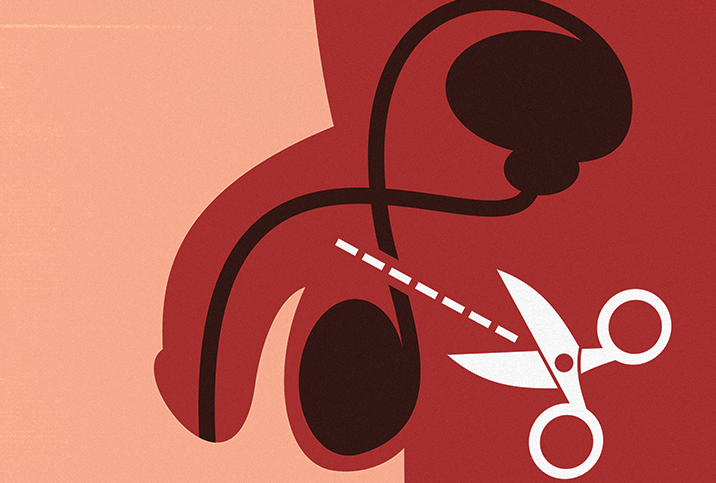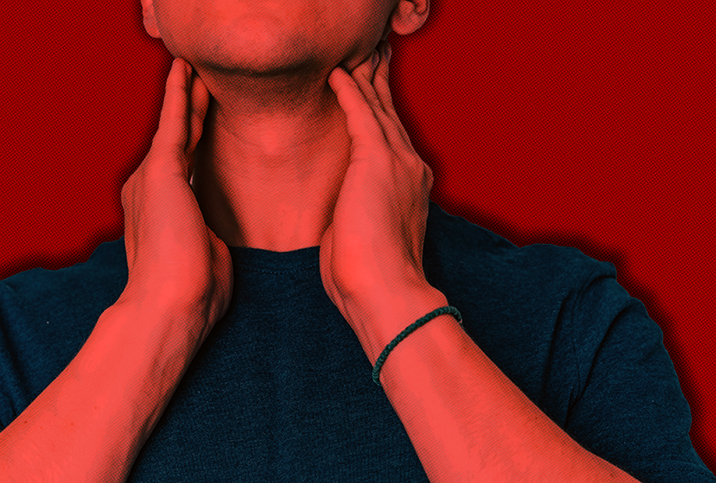Please Stop Believing These Inaccuracies About the Causes of ED

Erections involve a complex interplay of psychological, physiological and physical factors, any one of which can trip the switch. Erectile dysfunction (ED) affects men at a rate of about 10 percentage points per decade of age—so 40 percent in their 40s, 50 percent in their 50s, etc.—according to Cleveland Clinic.
More men than that likely encounter one or more myths about the causes of ED.
It is increasingly common with age, but young guys experience ED, too, usually for different reasons. If you're experiencing ED—defined by Johns Hopkins Medicine as the persistent inability to achieve or maintain an erection—knowing the facts can empower you to take charge of your health and revive your sex life.
Here's the truth behind six common misconceptions about ED causes.
Inaccuracy #1
ED means there's something wrong with your penis, and only your penis
Age-related physical changes, traumatic injuries, Peyronie's disease, and a history of radiation or surgery to the genital area can contribute to ED; so can mental health.
But ED often signals health problems that affect much more than the penis, especially in younger guys.
"ED is a bellwether of future cardiovascular problems in younger men. If ED is occurring earlier than expected, and the penile arteries are having difficulty getting adequate blood flow into the penis, then it stands to reason that other important blood vessels, like those supplying blood to the heart, are in danger as well," said Martin Gross, M.D., a urologist who specializes in ED treatment at Dartmouth Hitchcock Medical Center in Lebanon, New Hampshire, in an email interview.
Diabetes, hypertension, high cholesterol, smoking, obesity and alcohol abuse can also damage the penile arteries and inhibit blood flow, Gross said, noting that he often encourages people younger than age 40 who are experiencing ED to talk to their primary care provider or a cardiologist for further evaluation.
Inaccuracy #2
ED is 'all in your head'
It's true that for some people, the problem isn't physical but psychological. Still, that doesn't mean erections are a mind-over-matter proposition. Mental health issues such as stress, anxiety and depression can markedly affect sexual health.
These conditions—and some medications used to treat them—can also contribute to or exacerbate other problems that might make it even more challenging to achieve and maintain erections.
Chronic stress, for instance, can take a toll on your cardiovascular system, and low libido and erectile issues are common side effects of antidepressants. Caring for your mental health through stress relief and relaxation techniques, therapy, medications and other tactics may improve your sex life, too.
Inaccuracy #3
ED means you're not attracted to your partner
Relationship issues can cause trouble in the bedroom, but the two aren't always related, according to Chris Kyle, M.D., M.P.H., a urologist based in Springfield, Oregon. In fact, a lack of physical attraction is a "minor cause" of ED, Kyle said.
"I would say the vast majority of the time when people are having erectile dysfunction, it has nothing to do with their partner at all. It has something to do with their physiology," he said, adding that it's important for people's partners not to take ED personally and for couples to communicate.
"One of the first things I counsel people about is the importance of communication and being very clear, saying, 'Hey, it's not that I'm not interested in you or not interested in doing this. It's just my parts aren't working the way I want them to,'" he said.
Inaccuracy #4
ED is a direct result of low testosterone
Testosterone impacts erections, but not as much as you might think.
"Most of my patients with ED have perfectly normal testosterone levels," Gross said. "And a great many of my patients with low testosterone have perfectly normal erectile function. Testosterone is responsible for overnight and morning erections, the fluky erections that one usually doesn't depend on for sexual activity.
"Intentional erections, generated by stimulation, are driven by a very complicated process that has nothing to do with testosterone," he said.
Gross added that while low-T is rarely the root of the problem for his typical ED patients, he checks testosterone levels anyway, because treating low-T is sometimes necessary to help manage or prevent other health issues.
"There is some evidence that improving testosterone levels improves how patients respond to oral medications to treat ED," he said. "But testosterone by itself is not an appropriate treatment for ED."
When low testosterone is driving erectile issues, it is most often associated with young men, Gross added.
Kyle explained that low-T is more closely correlated with low libido, which is a separate problem from ED. The parts may be working correctly, but the desire isn't there, he explained.
Research indicates testosterone therapy isn't a magic bullet. It doesn't appear to improve erections in men without a deficiency, and it doesn't seem to do much for people with moderate or severe ED.
Inaccuracy #5
Tight underwear causes ED
Tighty whities that are a bit too tight could contribute to infertility but won't impact your erections.
One study showed men who wore boxers had significantly higher sperm counts and concentration than those who wore briefs. That's because tight pants can raise the temperature of the testicles, potentially damaging sperm.
However, there's no evidence of attire affecting penile function.
Inaccuracy #6
Lifestyle doesn't impact erections
There's no harm in the occasional indulgence, but consistently making unhealthy choices can take a toll on your sexual health, including erectile function.
"Smoking and drinking are terrible for arteries," Gross said. "Imagine your arteries like delicate pipes. And then picture pushing toxic chemicals down those pipes all day long for years at a time. Eventually, the pipes will leak, clog or burst as a result of these dangerous chemicals and, thus, will be less able to carry out their normal duties.
"The arteries that supply blood into your penis are just about a millimeter wide at maximal dilation when pushing blood into your penis. They are narrow and tiny, and there is no backup blood supply system. It would be wise to keep them healthy," he added.
Kyle added that while there's no surefire, immediate way to boost sexual health, there's plenty of evidence that a healthy lifestyle—including a balanced diet, regular exercise and limited alcohol intake—can help.
Finding a sustainable way to treat and manage ED, no matter its cause, can lead to long-term positive outcomes. For a lot of men, a wearable device proves helpful. Eddie® is an FDA-registered Class II medical device designed to treat erectile dysfunction and improve male sexual performance. In 2021 clinical trials, Eddie proved effective in treating men with physically, psychologically and pharmacologically induced ED. Of the study participants, 93 percent of men who used Eddie reported a beneficial effect on their sex lives.


















